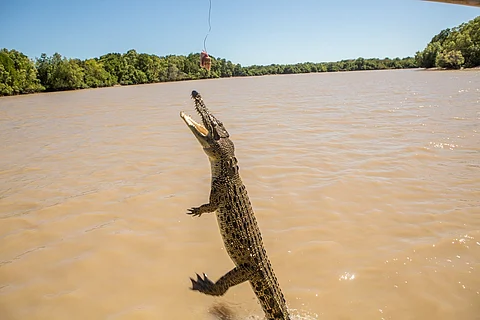

The saltwater or estuarine (Crocodylus porosus) crocodiles that call Australia’s northern coast home are changing their behaviour due to rising temperatures, which are making them unable to hunt, as per a new study.
Scientists from the University of Queensland’s School of the Environment analysed 15 years of information from sensors and trackers on 203 wild crocodiles on the Wenlock and Ducie rivers on Cape York Peninsula.
They found that crocodiles were spending more time at or close to their critical thermal limit of 32-33°C, when behavioural performance decreases, a statement by the university said.
Crocodiles are ‘ectotherms’. As cold-blooded animals they cannot regulate their own temperature like birds or mammals. As the environment warms, the animals are spending more time cooling themselves, according to the scientists.
But since they spend most of their time to keep cool, their activity necessary for hunting, keeping safe from predators or reproducing is reduced.
Temperature peaks experienced by the crocodiles in the study have increased by 0.5°C, and their median body temperature has increased by 0.11°C since 2008, according to the study.
Northern Australia’s mean temperatures are increasing 0.05 - 0.2°C per decade, the statement cited the Northern Australia Climate Program as having reported.
“Forty-five of the crocodiles in the study experienced body temperatures above 34°C at least once,” it added.
The hotter temperatures also impact the crocodiles’ hunting abilities. Usually, a crocodile needs to remain submerged and wait underwater to launch surprise ambush attacks on their prey.
But when they are above their thermal limit of 32-33°C, a crocodile’s diving and swimming performance is impacted and they can’t dive for long, according to the scientists.
The experts plan to look at what impacts behaviour change related to higher body temperatures may be having on the overall health of the crocodile population.
The research has been published in Current Biology.